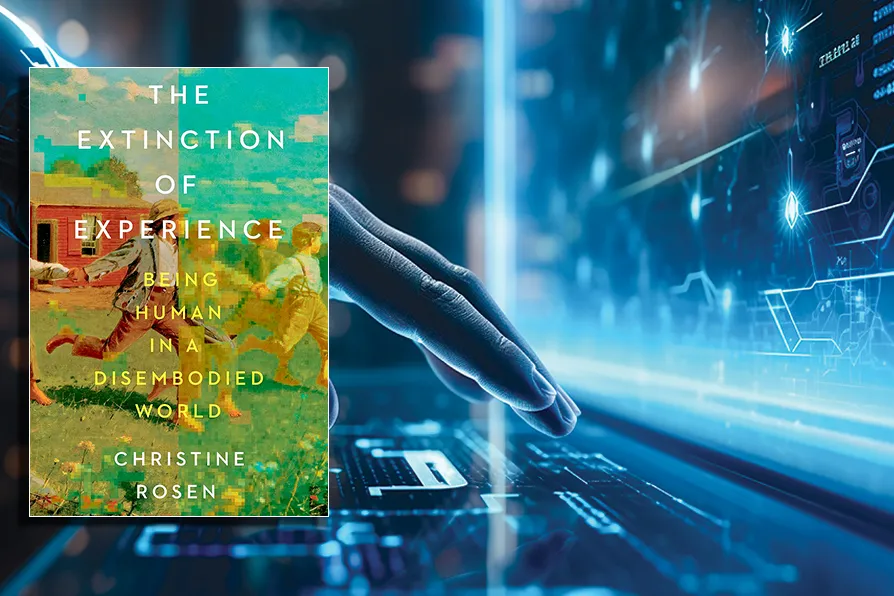New releases from The Orb, Meredith Monk, and Marconi Union
ANDY HEDGECOCK admires a critique of the penetration of our lives by digital media, but is disappointed that the underlying cause is avoided

 Pic: Kharsohtun/CC
Pic: Kharsohtun/CC
The Extinction of Experience
By Christine Rosen
Bodley Head, £22
LAST November, musician Tim Arnold wrote an open letter to the Mayor of London, objecting to advertisements for 5G technology on the tube. Arnold and his 194 co-signatories felt the ads normalised childhood phone addiction and championed a “relentless march into digital dependency.”
The risks posed to children and teenagers by technologically mediated experience, particularly those exposed to it in their early years, is set out in Christine Rosen’s timely study.
However, Rosen sees this as an issue affecting people of all ages. Assessing an array of evidence relating to the impact of screen-based technologies, she identifies deleterious changes in perception, thought, human interaction and participation in the physical world.
Her exploration of remote communication and digital simulation is even-handed. For example, she recognises that social media can act as a tool of empowerment and inclusion. Her style is clear and her exposition of the threats we face is based on detailed analysis of personal experience, news stories and academic studies.
Chapters focus on a range of social and psychological transformations – the vast reduction in face-to-face interaction; the unwillingness to experience boredom, discomfort and delay; the cognitive impact of the decline in handcrafting (including the demise of cursive handwriting); the loss of our ability to “read” the physical signs of emotion; and the redefinition of sexual relationships by the vicarious pleasures of online pornography. It’s alarming that the author feels obliged to tell us that “information about pleasure is not the same thing as the experience of it,” but the copious and compelling evidence she presents on the themes of sex, art and play suggest her cautionary reminder is not merely necessary but vital.
One of Rosen’s conclusions is that we need to focus more time and energy on the real world, in the physical presence of nature and our fellow human beings. A laudable sentiment but an unlikely outcome in the absence of any genuine challenge to the marketing power and transglobal reach of TikTok, Google, Facebook, X and YouTube.
This highlights a paradox at the heart of the book. Rosen is relentless in identifying the ways in which virtuality and remote communication damage the fabric of society, but is reluctant to acknowledge that the harms of the digital revolution may be determined by the demands of capitalism.
This is apparent in an early chapter, You Had To Be There. Rosen evaluates the attempts of social media businesses to replace physical reality with a digitally improved version. Mark Zuckerberg, CEO of Meta, characterises this as a quest for “frictionless” experience. It’s clear that Rosen is appalled at the prospect of humanity’s withdrawal from physical reality and our downgrading of public spaces to mere WiFi hotspots. She’s also sceptical about data harvesting, the rise of online influencers and the tendency of the billionaire “tech bros” to transform every shred of human activity into a form of currency and/or a marketing opportunity.
Despite this, she sees technology as the only active agent in the retreat from experience – highlighting the role of phones and apps in transforming human behaviour but overlooking the possibility that the design of our machines is inspired by the profit motive. Rosen detects the symptoms of a society being undermined by its tools and techniques, but her assessment is solidly grounded in the mindset of a conservative academic and columnist. As a result, the underlying malaise is never clearly identified.
The Extinction of Experience is an engaging and informative lament for the rejection of the real, but one that fails to tackle the structural factors leading us down the digital rabbit hole.

Digital ID means the government could track anyone and then limit their speech, movements, finances — and it could get this all wrong, identifying the wrong people for the wrong reasons, as the numerous digital cockups so far demonstrate, warns DYLAN MURPHY

ANDY HEDGECOCK recommends that these beautifully written diaries from Gaza be essential reading for thick-skinned MPs

ANDY HEDGECOCK relishes an exuberant blend of emotion and analysis that captures the politics and contrarian nature of the French composer











